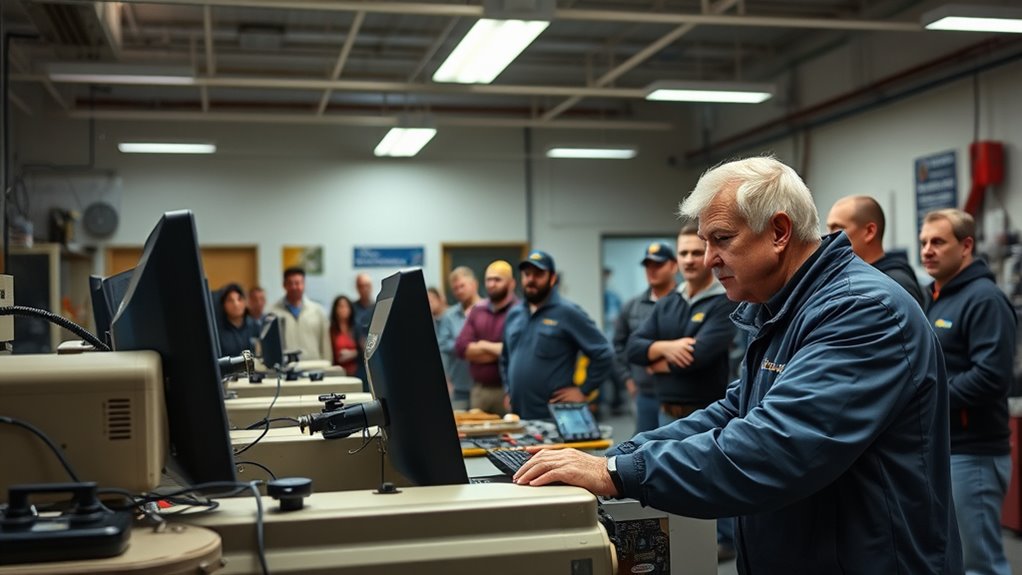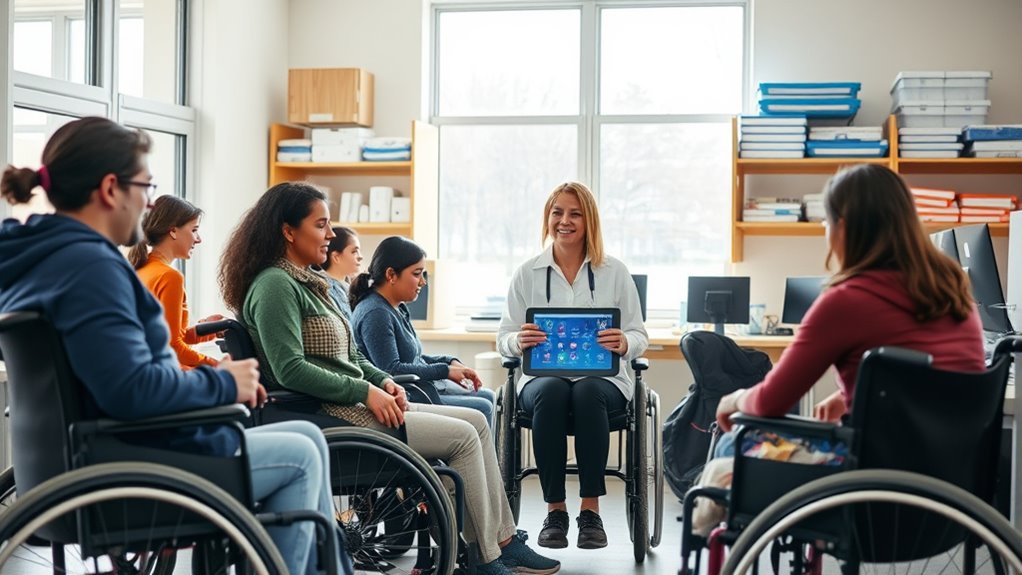Vocational rehabilitation programs help you shift from military service by offering personalized retraining, employment support, and mental health services. They recognize your skills and experiences, guiding you toward new careers that suit your interests. These programs also provide counseling and resources to manage stress and emotional challenges, building your confidence. If you keep exploring, you’ll discover how these programs can be tailored to help you succeed in civilian life.
Key Takeaways
- Vocational rehabilitation programs recognize military skills and provide personalized assessments to support civilian employment transitions.
- They include mental health services to help veterans manage stress, depression, and PTSD during re-training.
- Programs offer job training, resume workshops, interview coaching, and job placement assistance through employer partnerships.
- Active participant engagement and goal setting are encouraged, with mental health support to maintain motivation and resilience.
- Overall, these programs facilitate tailored support, skill development, and confidence for a successful civilian career transition.

Returning to civilian life after military service can be both exciting and challenging. As you shift, you might find yourself steering new routines, building fresh relationships, and figuring out your next career move. One of the key elements in this process is understanding that your mental health plays a vital role in your overall well-being and success. Moving from a structured military environment to civilian life can sometimes cause stress, anxiety, or feelings of uncertainty. That’s why many veterans turn to vocational rehabilitation programs, which are designed to support you through re-training and employment assistance.
Transitioning to civilian life can be challenging; prioritizing mental health and utilizing vocational programs supports a successful shift.
These programs recognize that your skills and experiences from service are valuable, but they also acknowledge that you may need additional training to change into a civilian career. Vocational rehab offers personalized assessments to identify your strengths, interests, and any challenges you might face, including mental health issues. Addressing mental health is essential because it directly influences your ability to learn new skills, stay motivated, and maintain stability during your shift. Many programs include counseling services or mental health support to help you manage stress, depression, or post-traumatic stress disorder, ensuring you’re in the best state to pursue your goals. Recognizing the importance of mental health and well-being can significantly improve your chances of successful re-entry into civilian employment.
Employment assistance is another core component of vocational rehabilitation. Whether you’re looking to leverage your military skills or explore entirely new fields, these programs connect you with job training, resume workshops, interview coaching, and job placement services. They often partner with local employers, increasing your chances of finding meaningful employment that matches your interests and capabilities. This support isn’t just about finding a job; it’s about building a sustainable career that offers stability and personal fulfillment.
Throughout the re-training process, you’re encouraged to take an active role in setting your goals. The programs provide guidance and resources, but your motivation and participation are key. They also recognize that the path to civilian employment isn’t always straightforward, and setbacks can happen. That’s why ongoing mental health support and employment assistance are integrated into the process, helping you stay resilient and focused.
In essence, vocational rehabilitation programs serve as a comprehensive bridge from military service to civilian life. They acknowledge the importance of mental health and provide tailored employment assistance to help you succeed. By taking advantage of these resources, you’re investing in your future, gaining new skills, and stepping confidently into the next chapter of your life. Remember, shifting may have its hurdles, but with the right support, you can turn your military experience into a fulfilling civilian career.
Frequently Asked Questions
How Long Does Vocational Rehabilitation Typically Last?
The program duration for vocational rehabilitation varies depending on your individual needs. Typically, the rehabilitation timeline can range from a few months to over a year. You’re actively involved in assessments, training, and job placement, which all influence how long the process lasts. The goal is to tailor the program to help you regain employment efficiently, so the timeline adjusts based on your progress and specific circumstances.
Are There Specific Industries Prioritized in Re-Training Programs?
You might wonder if re-training programs prioritize certain industries. Generally, these programs consider your skills, preferences, and the current job market. Industry preferences vary based on regional demand, but programs often emphasize healthcare, IT, manufacturing, and skilled trades. During program selection, you’ll find options aligned with your interests and employment prospects. This tailored approach helps you gain relevant skills quickly, increasing your chances of successful re-entry into the workforce.
Can Family Members Participate in the Re-Training Process?
You might wonder if family members can get involved in your re-training process. Yes, family involvement is often encouraged, as it provides emotional support and helps you stay motivated. They can assist with understanding your goals, offer encouragement, and be part of planning your next steps. Their support makes the re-training journey smoother, giving you confidence and reassurance as you shift into a new career.
What Financial Support Is Available During Re-Training?
During your re-training, you have access to financial support like grants and scholarship opportunities that can help cover your expenses. These resources are designed to make your progression smoother, so you don’t have to worry about finances. You might also qualify for additional benefits, depending on your circumstances. Take advantage of these options to focus on your training and successfully re-enter the workforce.
How Do I Choose the Right Vocational Program for My Needs?
When choosing the right vocational program, start with career counseling to understand your interests and goals. A skill assessment can identify your strengths and areas for improvement. Consider programs that align with your passions and offer job opportunities in your chosen field. Research the curriculum, certification options, and support services. Making an informed decision guarantees your training meets your needs, helping you move seamlessly into your new career.
Conclusion
As you consider vocational rehabilitation programs, remember they can profoundly boost your chances of successful re-entry into the workforce. Did you know that over 70% of veterans who participate in these programs find meaningful employment within a year? By taking advantage of available re-training opportunities, you’re not only investing in your future but also transforming your service experience into a new chapter of growth and achievement.










